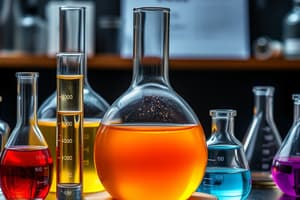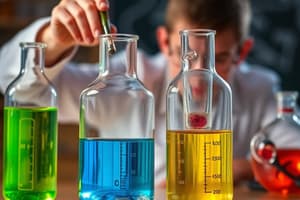Podcast
Questions and Answers
What is the primary purpose of the control group in an experiment?
What is the primary purpose of the control group in an experiment?
- To provide a standard for comparison (correct)
- To change the conditions of the experiment
- To isolate all variables
- To increase the sample size
Why might it be unrealistic to control all variables in environmental science experiments?
Why might it be unrealistic to control all variables in environmental science experiments?
- Only one variable should be tested
- Laboratory conditions mimic natural conditions perfectly
- Synergism involves multiple interacting variables (correct)
- Environmental factors are always the same
What type of reasoning is described as moving from specific observations to broader generalizations?
What type of reasoning is described as moving from specific observations to broader generalizations?
- Experimental reasoning
- Deductive reasoning
- Inductive reasoning (correct)
- Hypothetical reasoning
What might be a flaw in the entomologist's experiment regarding the ants?
What might be a flaw in the entomologist's experiment regarding the ants?
How does deductive reasoning differ from inductive reasoning?
How does deductive reasoning differ from inductive reasoning?
What result did the experimental group of ants show in the presence of pesticides?
What result did the experimental group of ants show in the presence of pesticides?
Which of the following best exemplifies inductive reasoning based on the examples given?
Which of the following best exemplifies inductive reasoning based on the examples given?
What challenge does the entomologist face when interpreting the study results?
What challenge does the entomologist face when interpreting the study results?
What is the primary goal of science?
What is the primary goal of science?
When does a hypothesis become a scientific theory?
When does a hypothesis become a scientific theory?
What is a scientific natural law?
What is a scientific natural law?
Which step comes first in the scientific method?
Which step comes first in the scientific method?
What is required for a hypothesis to be accepted in scientific research?
What is required for a hypothesis to be accepted in scientific research?
How does the first law of thermodynamics relate to scientific laws?
How does the first law of thermodynamics relate to scientific laws?
What process is exemplified by testing a phone charger with another phone?
What process is exemplified by testing a phone charger with another phone?
What distinguishes scientific theories from scientific laws?
What distinguishes scientific theories from scientific laws?
Flashcards
Science
Science
The attempt to understand and organize nature to predict future events.
Scientific Hypothesis
Scientific Hypothesis
A tentative explanation of observations, requiring testability and reproducibility.
Hypothesis Requirements
Hypothesis Requirements
Explains data, makes predictions, and can be repeatedly tested yielding consistent results.
Scientific Theory
Scientific Theory
Signup and view all the flashcards
Scientific Law
Scientific Law
Signup and view all the flashcards
Scientific Method Observation
Scientific Method Observation
Signup and view all the flashcards
Hypothesis Formation (Step)
Hypothesis Formation (Step)
Signup and view all the flashcards
Testing a Hypothesis
Testing a Hypothesis
Signup and view all the flashcards
Controlled experiment
Controlled experiment
Signup and view all the flashcards
Experimental vs. Control group
Experimental vs. Control group
Signup and view all the flashcards
Synergism (in environmental science)
Synergism (in environmental science)
Signup and view all the flashcards
Mathematical models
Mathematical models
Signup and view all the flashcards
Inductive reasoning
Inductive reasoning
Signup and view all the flashcards
Deductive reasoning
Deductive reasoning
Signup and view all the flashcards
Scientific thinking
Scientific thinking
Signup and view all the flashcards
Inconsistencies in experiments
Inconsistencies in experiments
Signup and view all the flashcards
Study Notes
Scientific Method
- Science aims to understand nature and predict events.
- The process involves asking questions, collecting data (observations/measurements), and developing explanations (hypotheses).
- A valid hypothesis must explain data, make predictions, and be reproducible.
- A hypothesis becomes a theory when rigorously tested and consistently supported.
- A scientific law describes a repeatedly observed natural phenomenon (e.g., the law of thermodynamics).
- Scientific laws describe what happens, while theories explain why.
- Critical thinking (scientific thinking) can be applied to daily life.
Hypothesis Formation and Testing
- Scientific studies often start with an observation leading to a question.
- A possible explanation (hypothesis) is formed.
- Hypotheses are tested through experimentation.
- A controlled experiment isolates a single variable for testing.
- This involves an experimental group and a control group.
- Other variables may impact the results in real-world scenarios (e.g., environmental science).
- Mathematical modeling is used in scenarios with multiple interacting variables.
Inductive and Deductive Reasoning
- Inductive reasoning: Moves from specific observations to general conclusions.
- Example: Observing multiple dogs barking at cars = conclusion: all dogs bark at cars (not necessarily true).
- Deductive reasoning: Moves from general principles to specific conclusions.
- Used to reach logical conclusions based on scientific generalizations.
- Example: All birds can fly, penguins are birds; therefore, penguins can fly (incorrect, and thus shows deduction can be invalid).
Example: Pesticide and Ants
- An entomologist observed fewer ants in an area with pesticide application.
- A controlled lab experiment was set up: one group of ants with pesticide exposure, one without.
- The ants avoiding the pesticide in the lab led to the conclusion that the pesticide repels them.
- This experiment does not account for wild differences, which may be significant, and the lab result does not necessarily apply to the field.
Studying That Suits You
Use AI to generate personalized quizzes and flashcards to suit your learning preferences.




